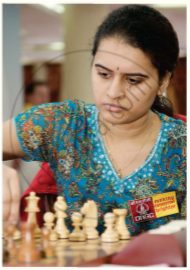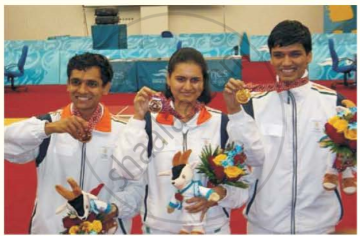Advertisements
Advertisements
प्रश्न
(a) Given below are five lines from a poem but they are not in the right order.
Get into groups of four. Read the lines and put them in the right order. Read
the version that you develop to the whole class.

(b) Who is 'I' in these lines?
(c) Imagining yourself as the subject of this poem, write five lines about
yourself in less than five minutes.
You may like to
- define yourself
- state what you do
- explain why people like/dislike you
- mention any other characteristic about yourself
उत्तर
(a)

(b) ‘I’ stands for the rain.
(c) For self-study.
APPEARS IN
संबंधित प्रश्न
Answer these question in a few word or a couple of sentences .
How old are Margie and Tommy?
Who had these opinion about Einstein?
He was a freak.
Avik, a correspondent for his school magazine, interviews Grandmaster Koneru Bumpy. Let us read :
INTERVIEW WITH KONERU BUMPY
Avik : Good morning, Ma'am! Congratulations on your achievements in the World Grand Prix Women's Chess Championship in Istanbul recently!

Koneru Humpy : Thank you! This is my biggest win in the women's circuit. This is very significant, considering that it has come in an event which had three former world champions.
Avik : Indeed! Please tell us something about yourself, Ma' am!
Koneru Humpy : I was born in Gudivada, near Vijaywada, in Andhra Pradesh on March 31, 1987. I was originally named 'Humpi' {which means champion) by my father Mr Koneru Ashok, who later changed the spelling to Humpy, to give the nrune a Russian flavour. I write my family name , Koneru, before my given name, as is the convention with the Telugu speaking people. I started playing chess when I was 5 years old.
Avik : Who introduced you to the game?
Koneru Humpy : My father acquainted me with the game. He is also my first coach. I first showed interest at the age of 6 years, when I watched him play a game and suggested a move. Indeed it was the move that actually got me into the game.
Avik : Your father left his teaching profession to make you a champion !
Koneru Bumpy : Yes, when I took the 4th place in the Indian Under 8 Championship in 1995, he decided to leave his career and dedicate his time to me.
Avik : And you had won four World Championship at a very early stage.
Koneru Bumpy : Yes, the World Girl Under 10, the World Girls Under 12, the World Girls Under 14 and World Girls Junior Chrunpionships. I acquired my IM title in 1999 and in May 2002, I achieved my 3rd GM Norms in Elekes Memorial Grandmaster Tournrunent in Budapest.
Avik : You held the record from 2002 to 2008 for the youngest woman ever to become a grandmaster!
Koneru Bumpy : Yes, I achieved it at the age of 15 years, 1 month, 27 days, beating Judit Polgar's previous record by 3 months; which was later lost in the Women's World Chess Championship in 2008 to Hou Yifan. I won the World Junior Girls Chess Championship in 2001 and won the edition or North Urals Cup, the Women's Super Tournrunent held in Krasnoturinsk. In 2006, I participated in the Women's World Chess Chrunpionship, but my crunpaign had to end early in the second round. I played in the first board of Monte Carlo Chess Club and won the last two editions of the European Club Cup.
Avik : You have got some awards also !
Koneru Humpy : Yes, Arjuna Award in 2003, Padmashri Award in 2007 and Raja-Lakshmi Award in 2008.

Avik : In India, many young chess players are ready to take a break in education and are fully focussed on chess preparations. What are your views?
Koneru Humpy : I don't think that taking up chess as a career and completely neglecting studies will be necessary at an earlier stage. After getting to a certain level in the game, they themselves should decide their preferences i.e. whether to play seriously or not.
Avik : What advice would you offer to parents of enthusiastic and talented chess children?
Koneru Humpy : Parents should not compel children to play chess. If children are genuinely interested in the game, they should encourage them. But they shouldn't hurry to get results.

Avik : How often do you exercise? Do you think daily physical exercise can help a chess player to cope with the pressure and increase the brain's ability to concentrate?

Koneru Humpy : I spend around one hour per day on physical exercise. Exercise is a must for every chess player. As the proverb says, 'a sound mind in a sound body'. Exercise shows a lot of impact on the brain.
Avik : Thank you for talking to me and giving valuable advice.
Koneru Humpy : Thank you.
There was a time when our people covered the land as the waves of a wind-ruffled sea cover its shell-paved floor, but that time long since passed away with the greatness of tribes that are now but a mournful memory. 1 will not dwell on, nor mourn over, our untimely decay, nor reproach my paleface brothers with hastening it, as we too may have been somewhat to blame.
Youth is impulsive. When our young men grow angry at some real or imaginary wrong, and disfigure their faces with black paint, it denotes that their hearts are black, and that they are often cruel and relentless, and our old men and old women are unable to restrain them. Thus it has ever been. Thus it was when the white man began to push our forefathers ever westward. But let us hope that the hostilities between us may never return. We would have everything to lose and nothing to gain. Revenge by young men is considered gain, even at the cost of their own lives, but old men who stay at home in times of war, and mothers who have sons to lose, know better.
Read the extract given below and answer the question that follow.
Why did Seattle wanted to end up the hostilities?
From the day, perhaps a hundred years ago when he sun had hatched him in a sandbank, and he had broken his shell, and got his head out and looked around, ready to snap at anything, before he was even fully hatched-from that day, when he had at once made for the water, ready to fend for himself immediately, he had lived by his brainless craft and ferocity. Escaping the birds of prey and the great carnivorous fishes that eat baby crocodiles, he has prospered, catching all the food he needed, and storing it till putrid in holes in the bank. Tepid water to live in and plenty of rotted food grew him to his great length. Now nothing could pierce the inch-?thick armoured hide. Not even rifle bullets,
which would bounce off. Only the eyes and the soft underarms offered a place. He lived well in the river, sunning himself sometimes with other crocodiles-muggers, as well as the long-? snouted fish-?eating gharials-on warm rocks and sandbanks where the sun dried the clay on them quite white, and where they could plop off into the water in a moment if alarmed. The big crocodile fed mostly on fish, but also on deer and monkeys come to drink, perhaps a duck or two.
Read the extract given below and answer the question that follow.
What helped him grow to his present size?
Who finds it difficult to imagine what a desert is Uke?
With your partner, complete the following sentence in your own word using the ideas in the poem.
English is a __________________ with words that everyone can play.
The words given against the sentences below can be used both as nouns and verbs. Use them appropriately to fill in the blanks.
(i) He made his ______ in essay-writing. (mark)
(ii) Articles ______ ‘sold’ are reserved.
The words helper, companion, partner and accomplice have very similar meanings, but each word is typically used in certain phrases. Can you fill in the blanks below with the most commonly used words? A dictionary may help you.
find a good …………..
Read the lines given below and answer the following question:
| “But my darling, if you love me,” thought Miss Meadows, “I don’t Mind how much it is. Love me as little as you like.” |
What had the “darling” informed Miss Meadows?
